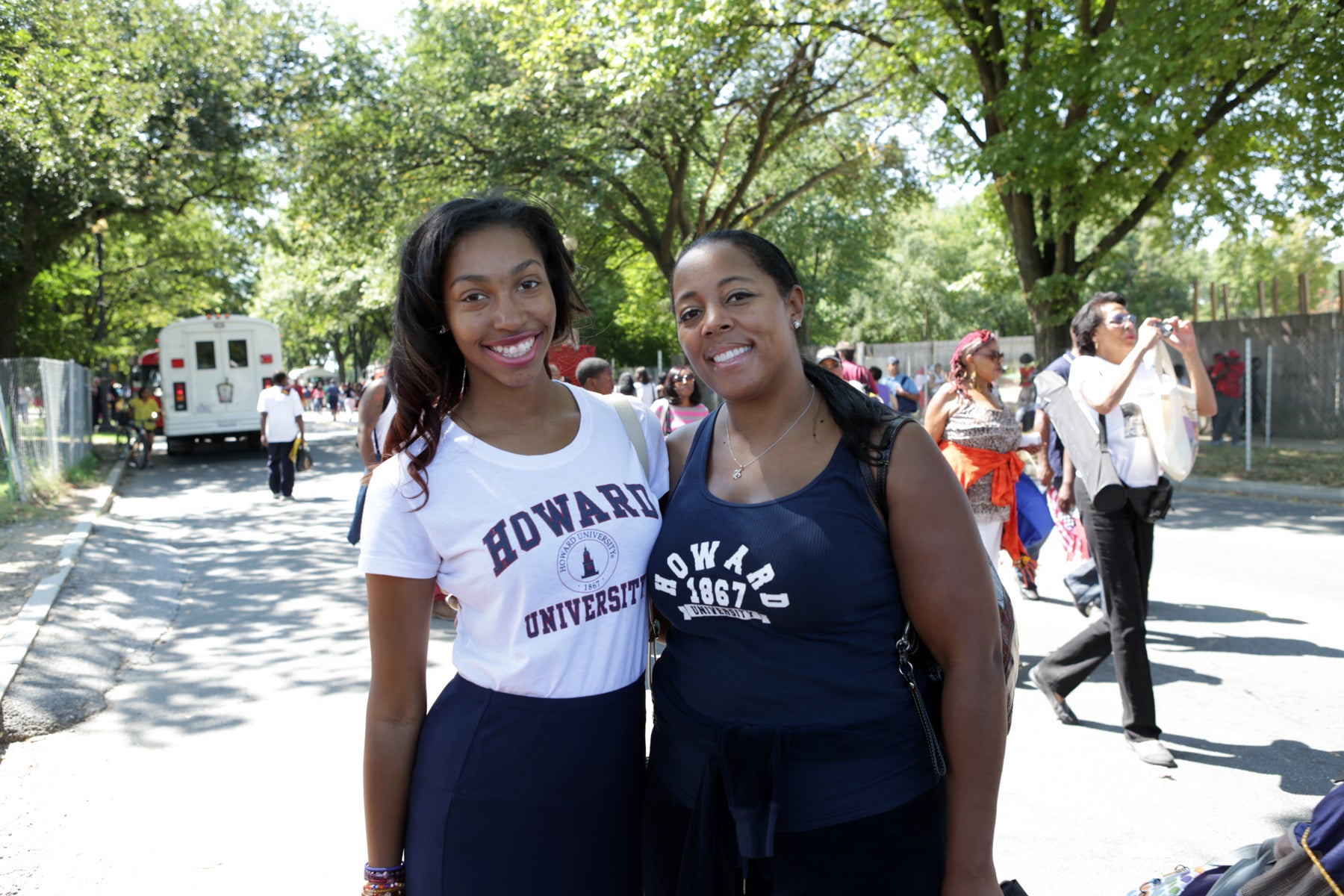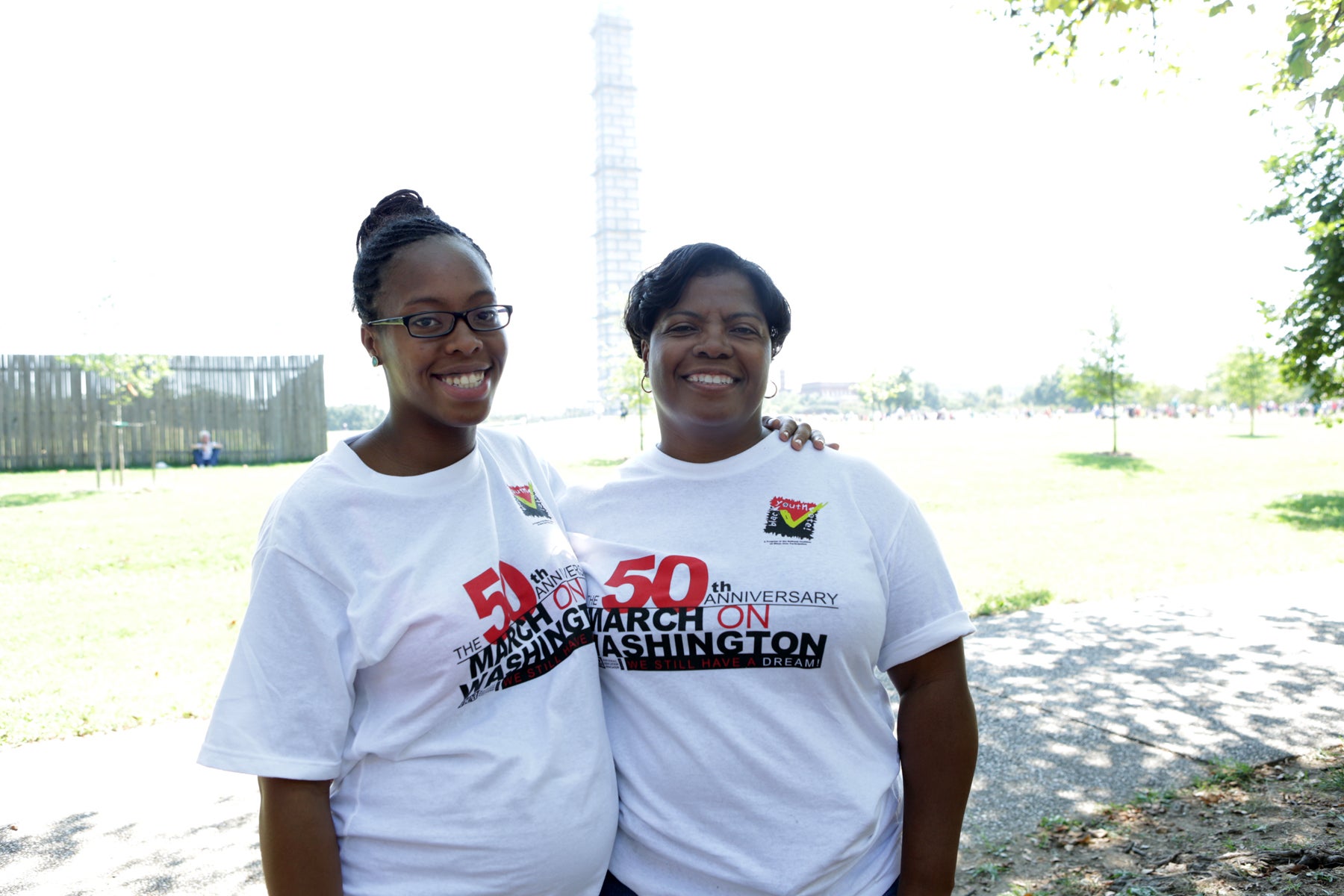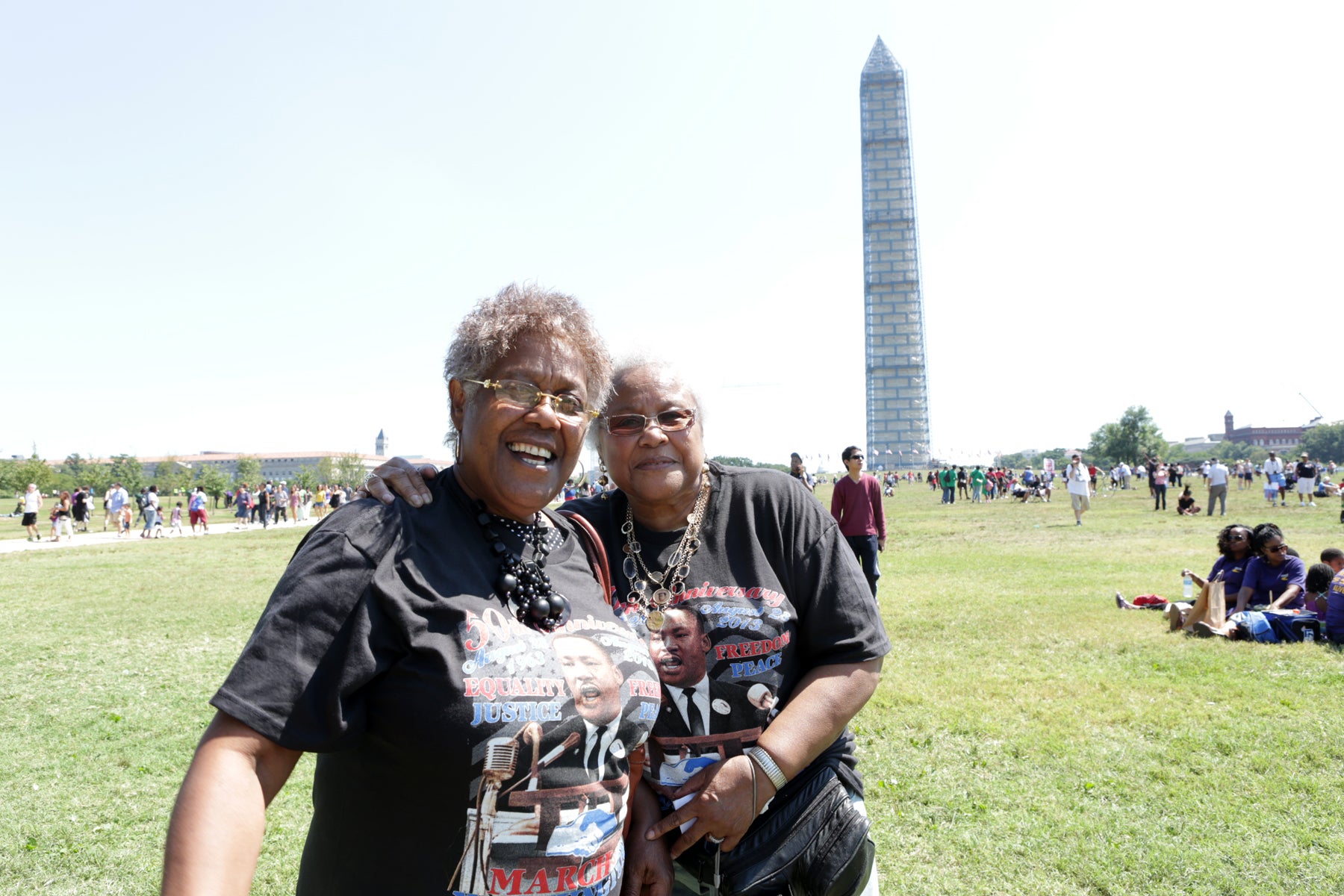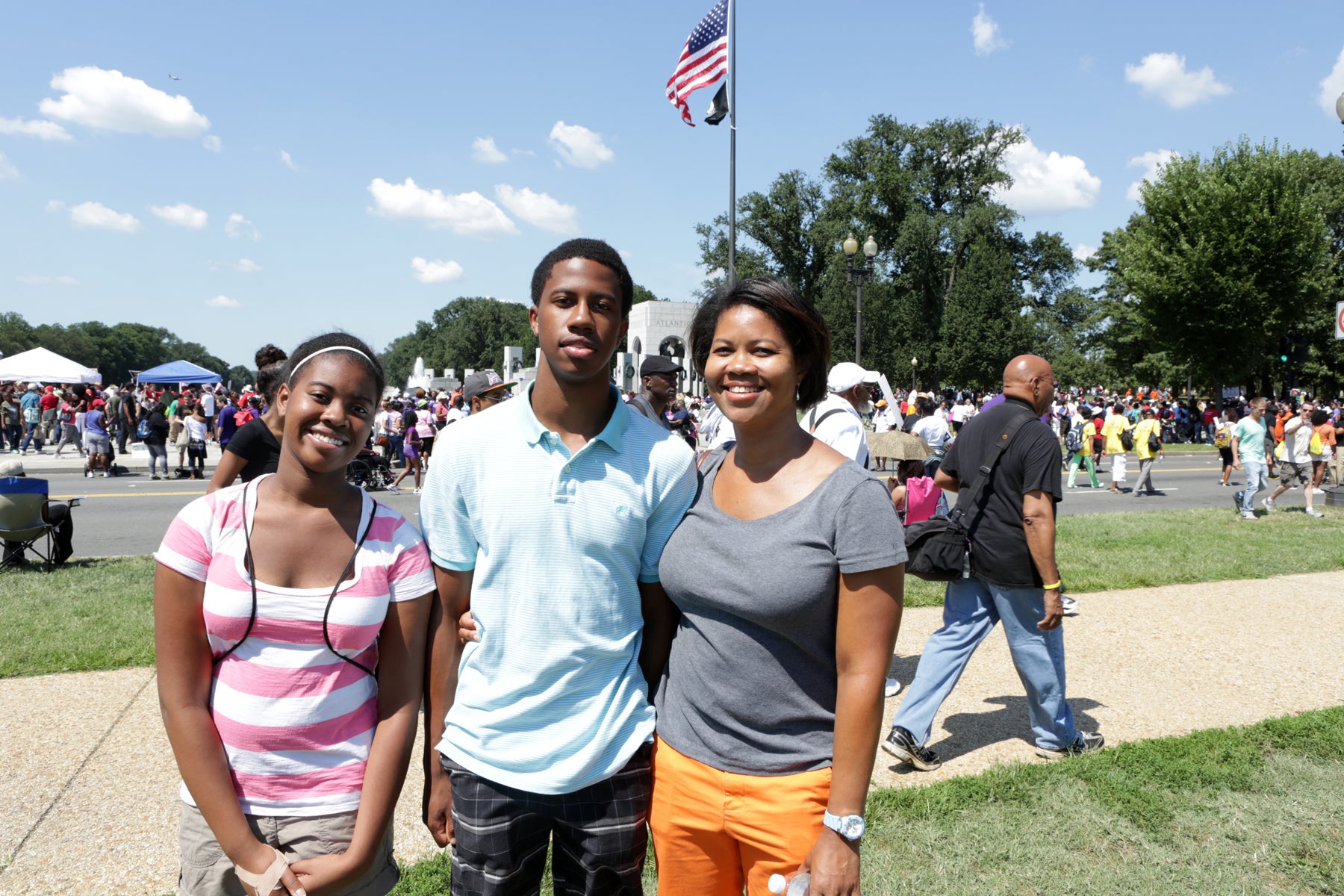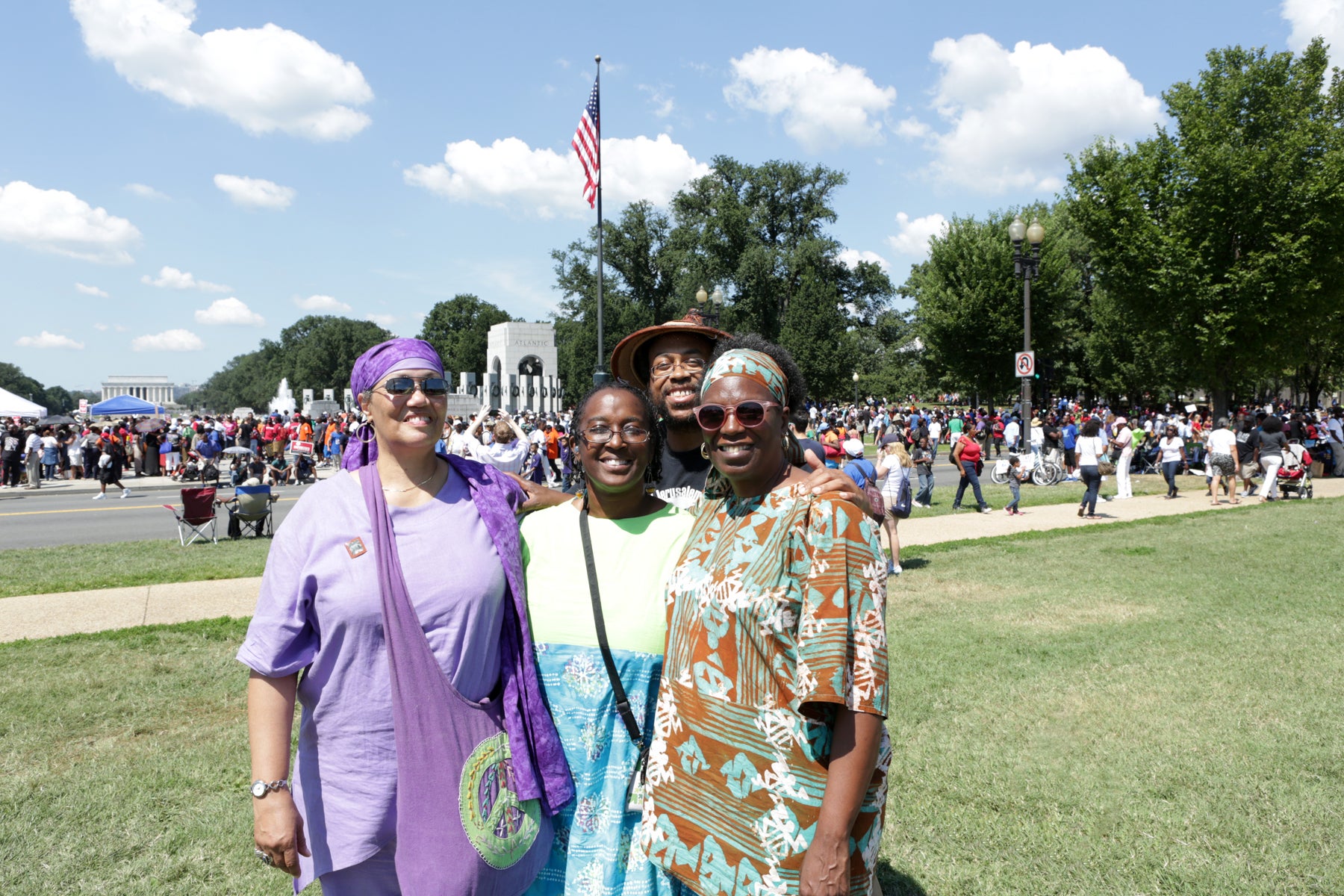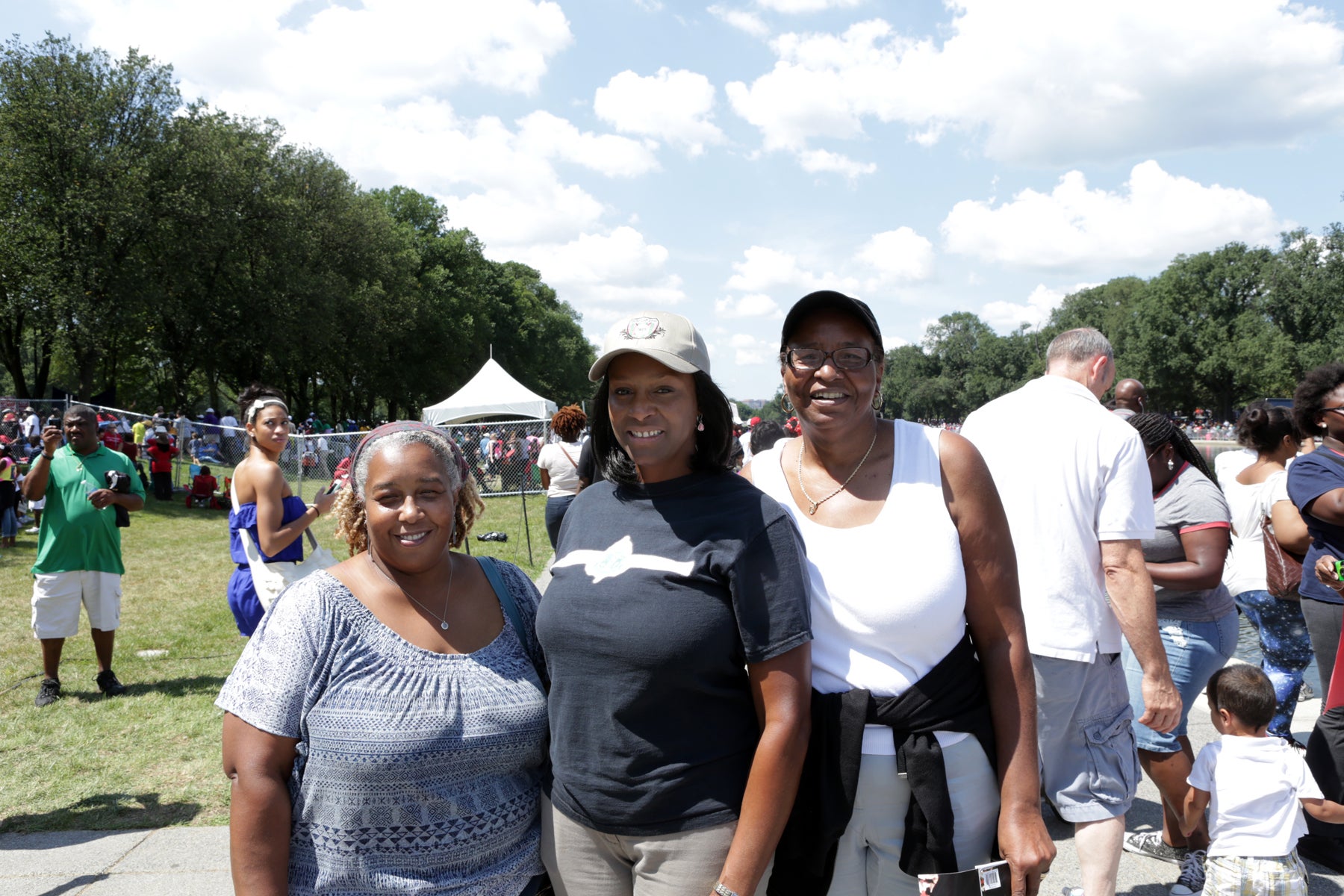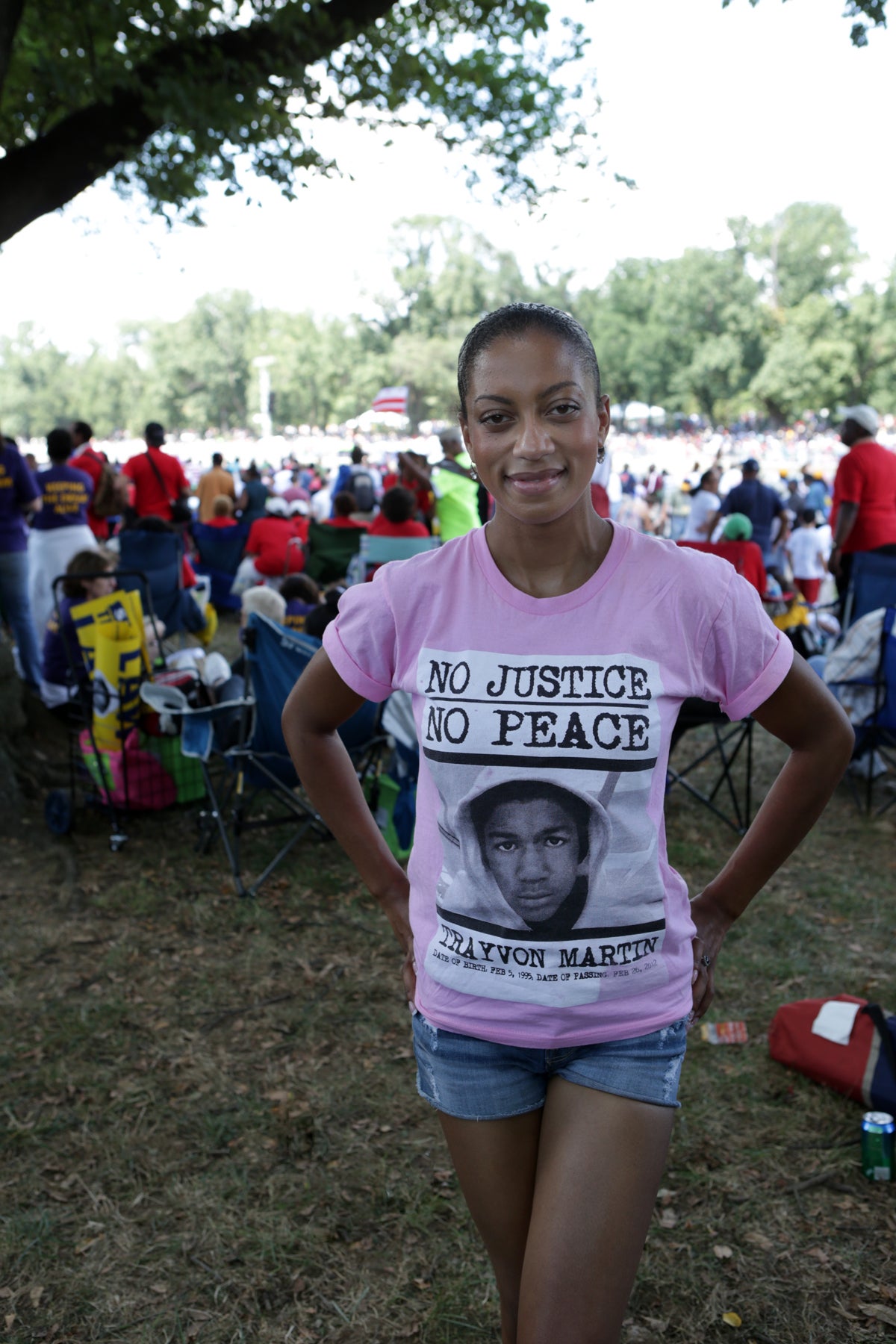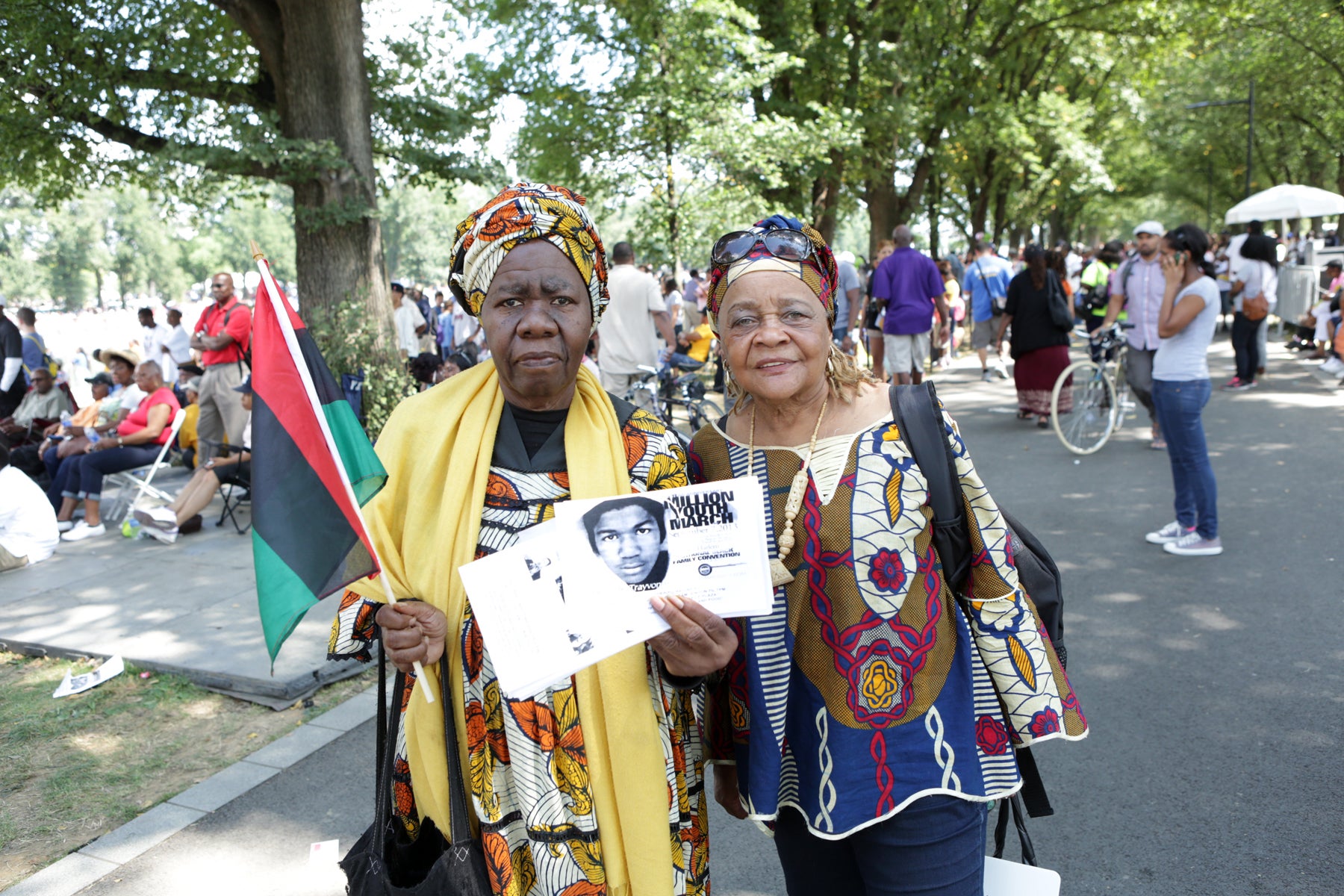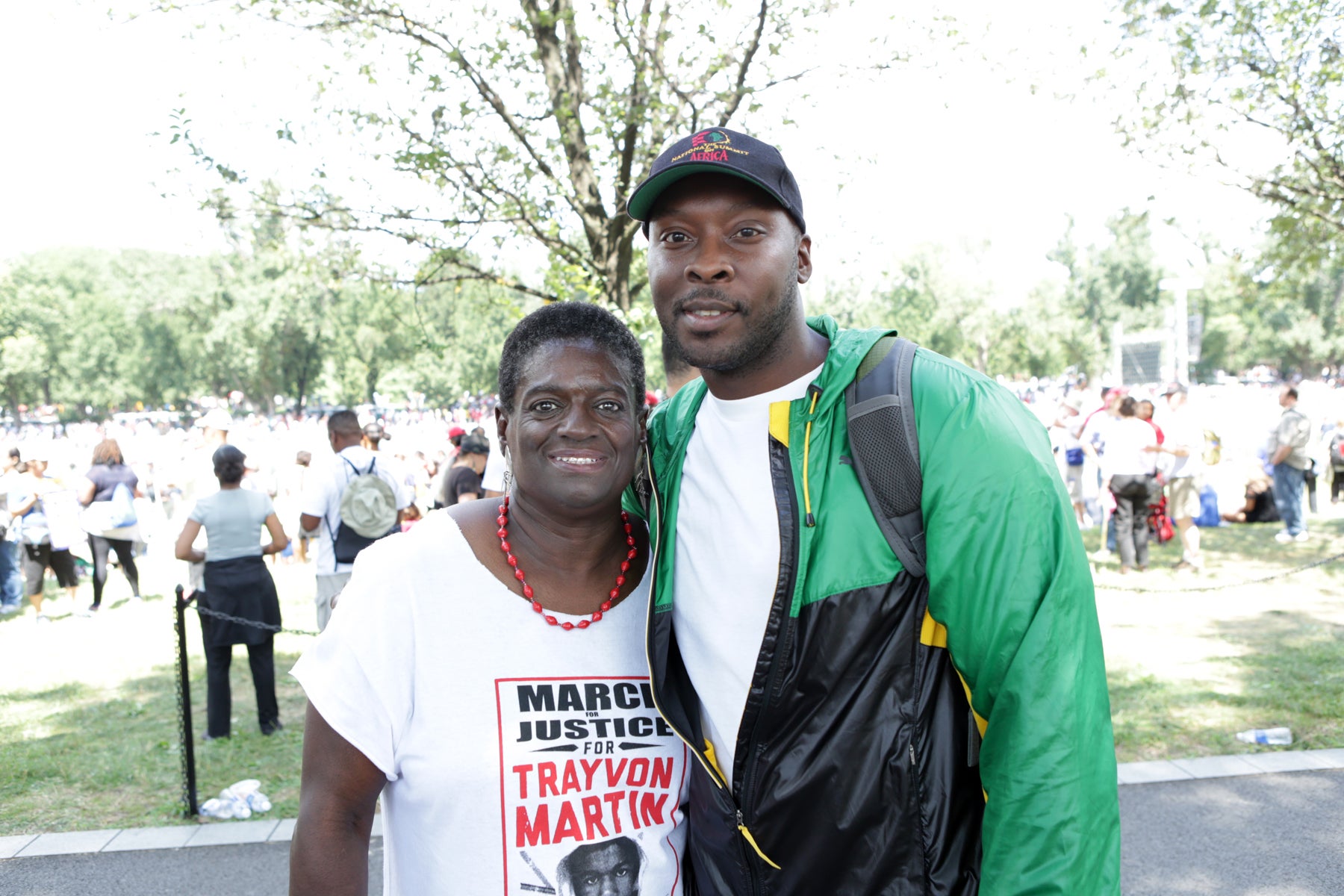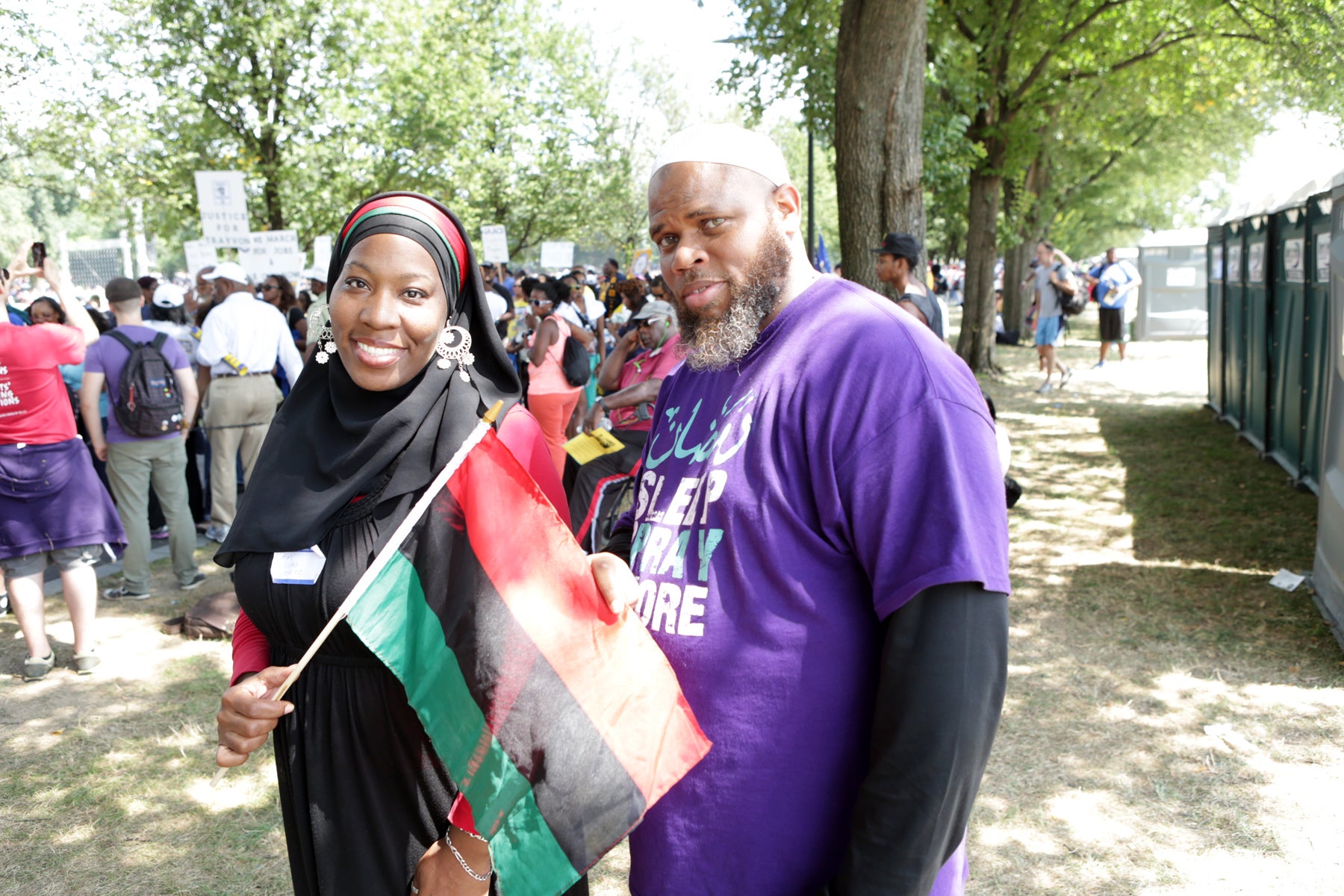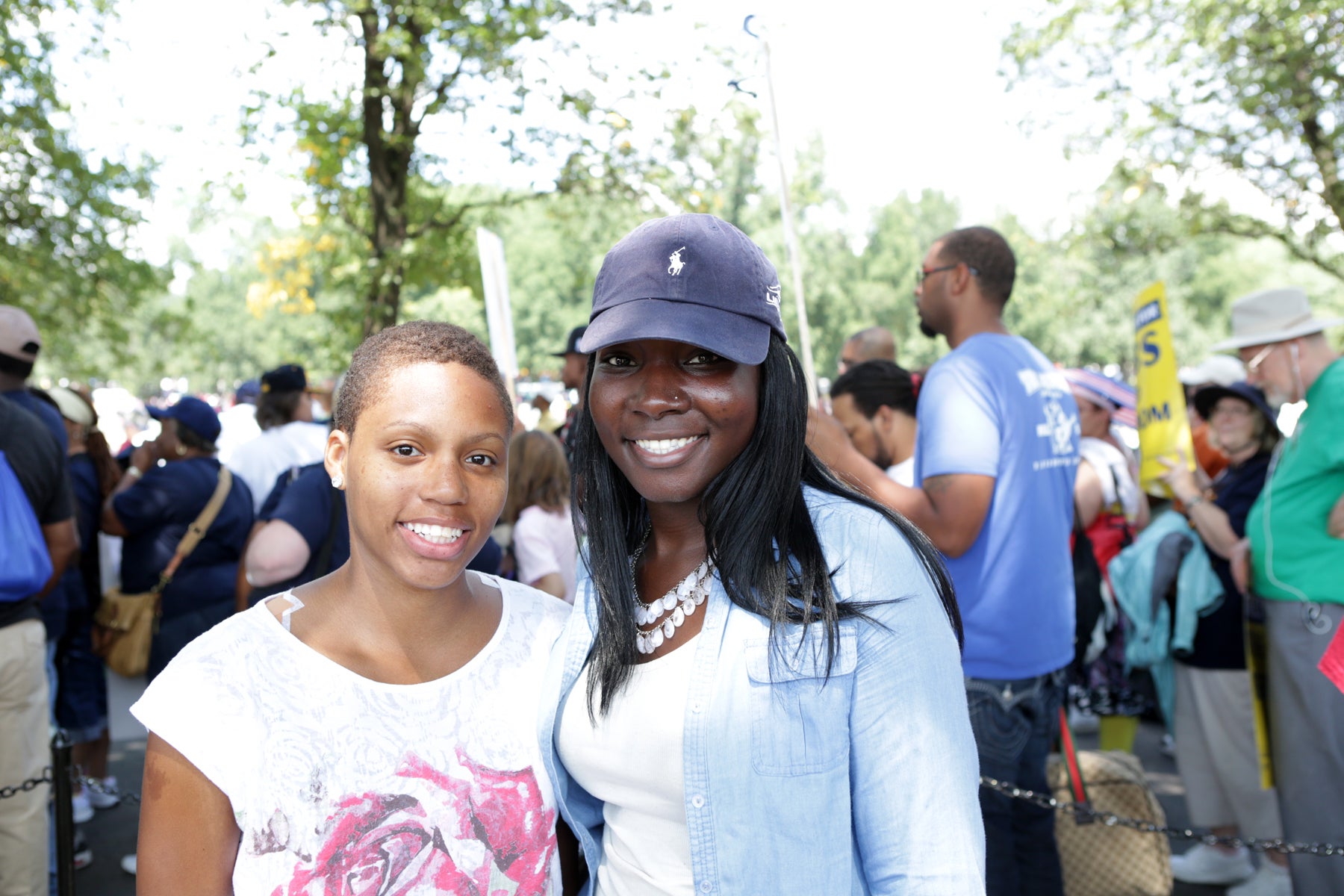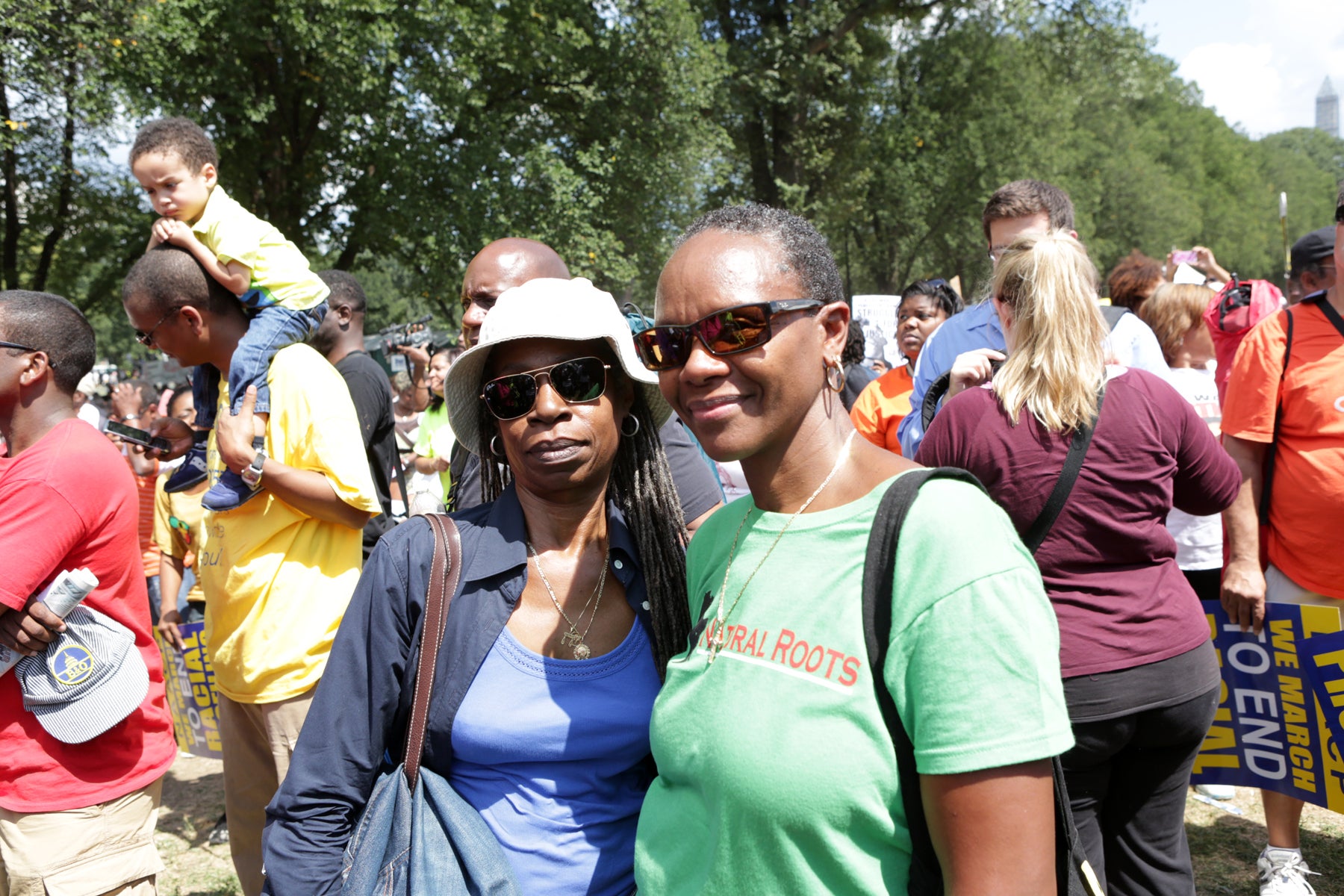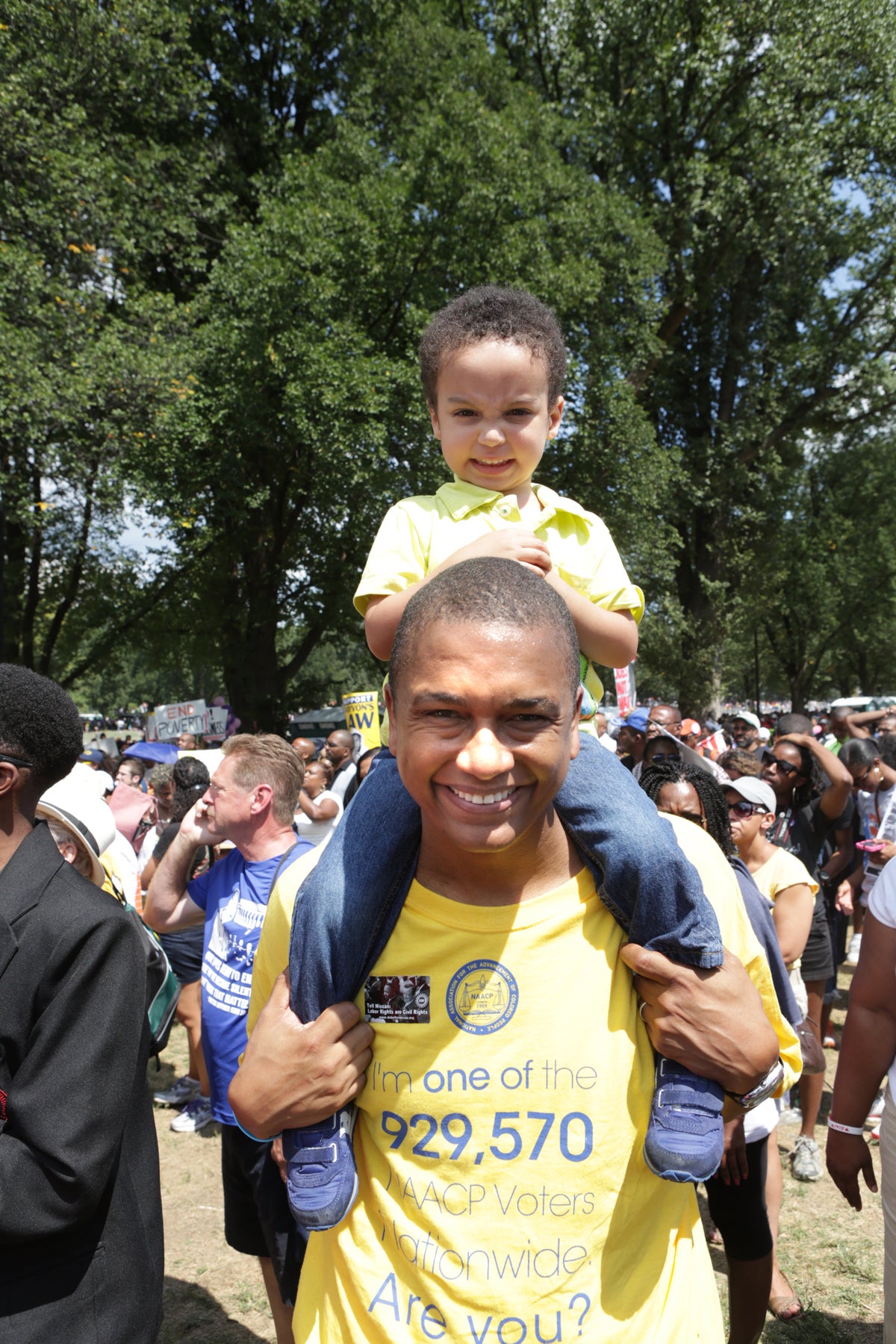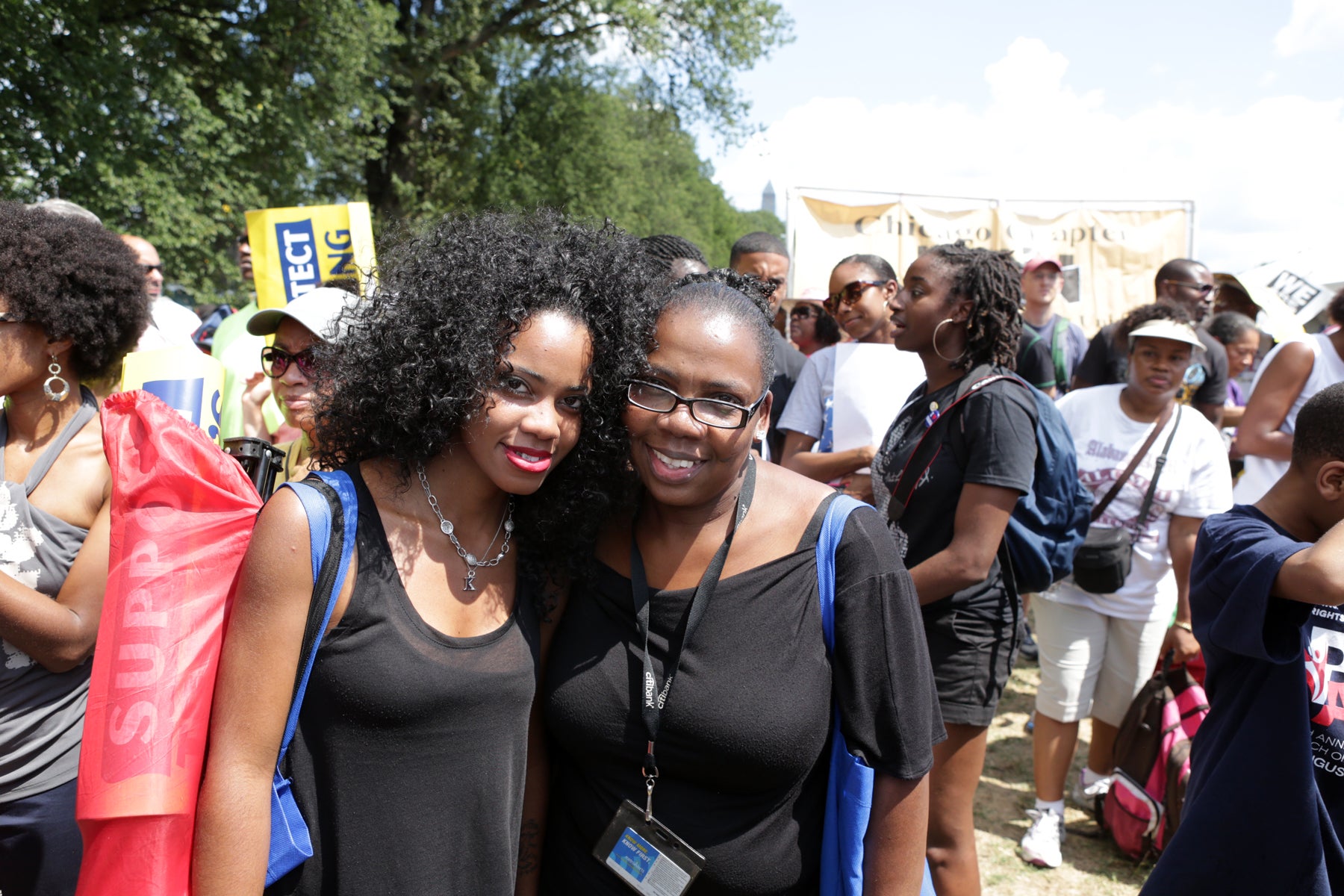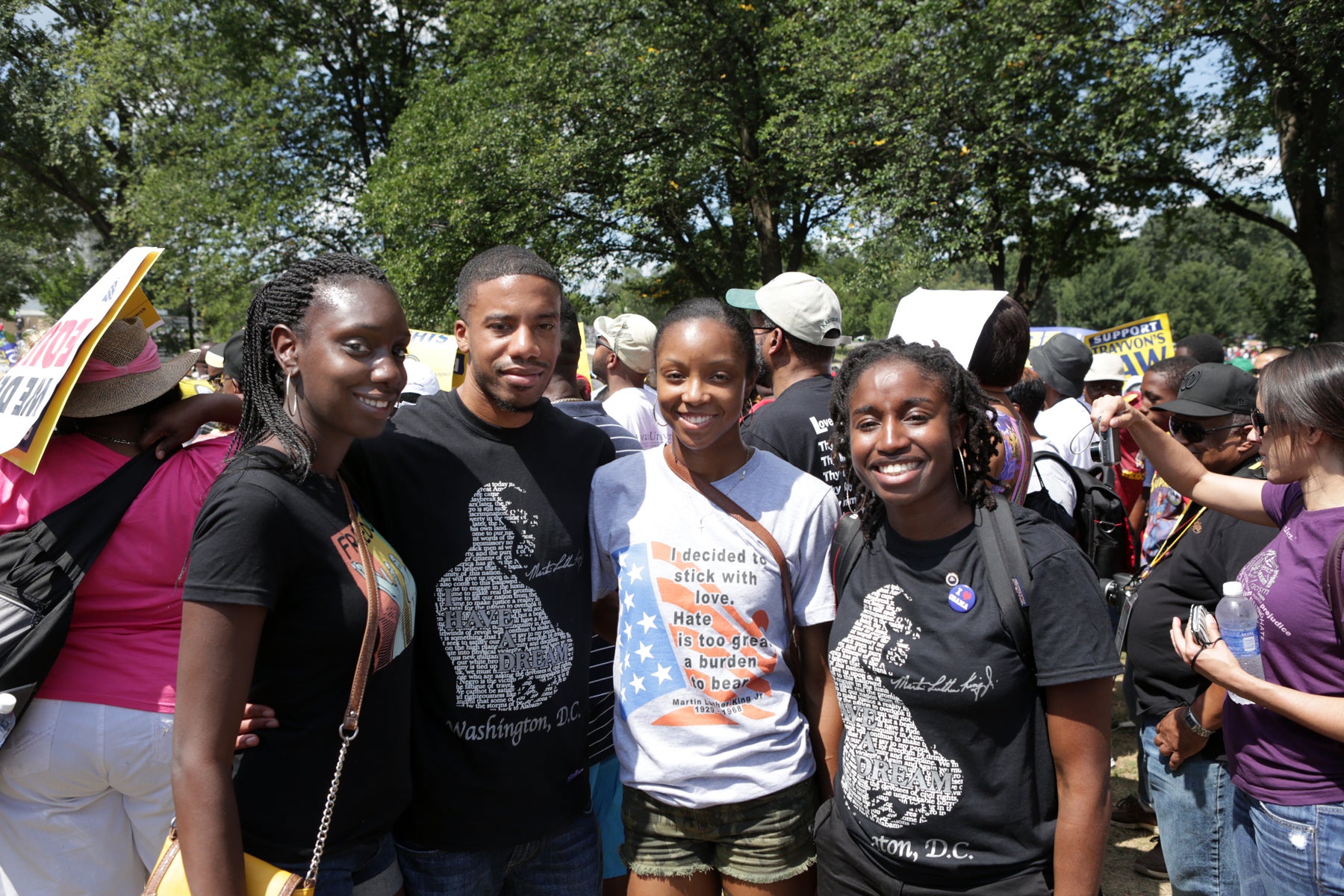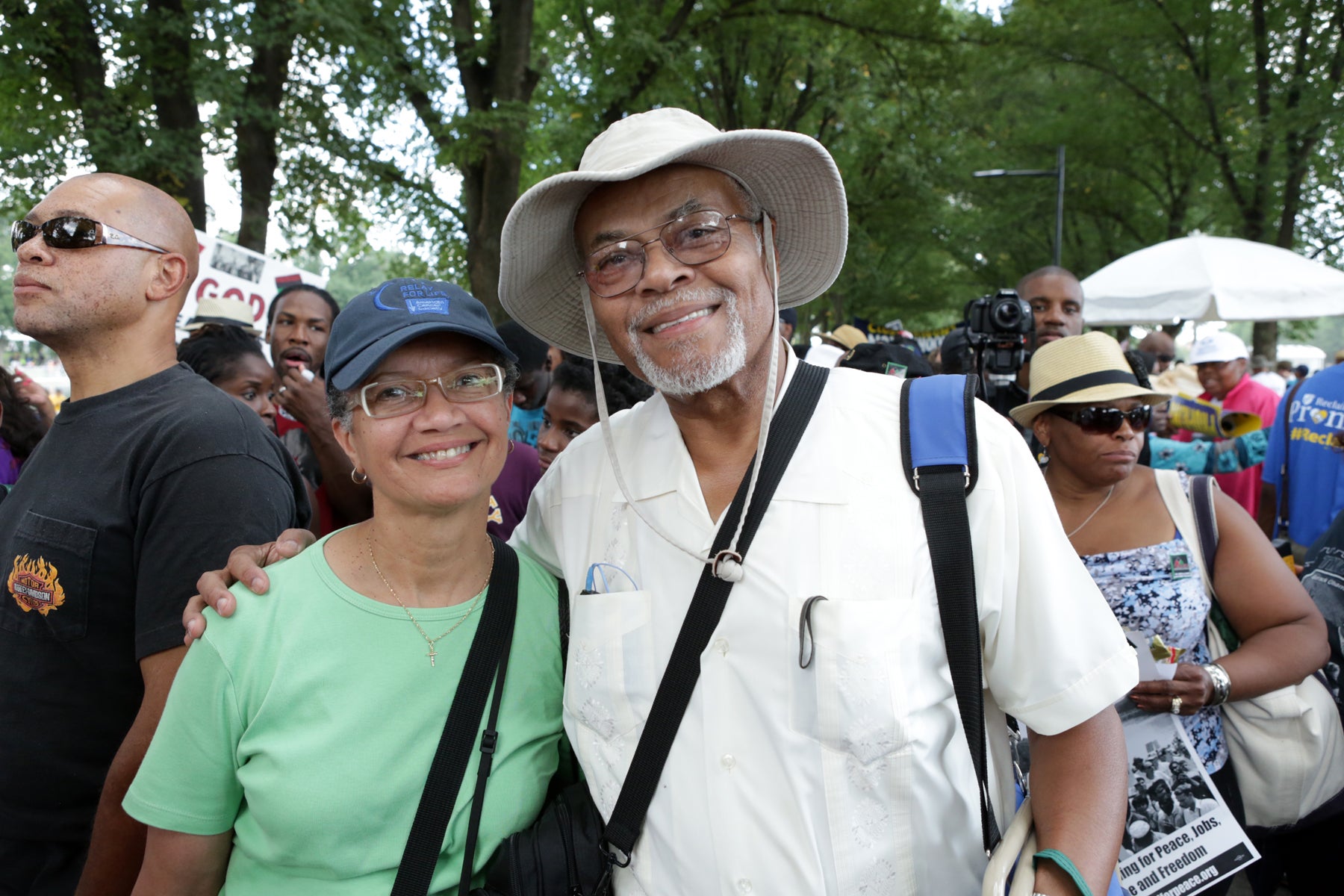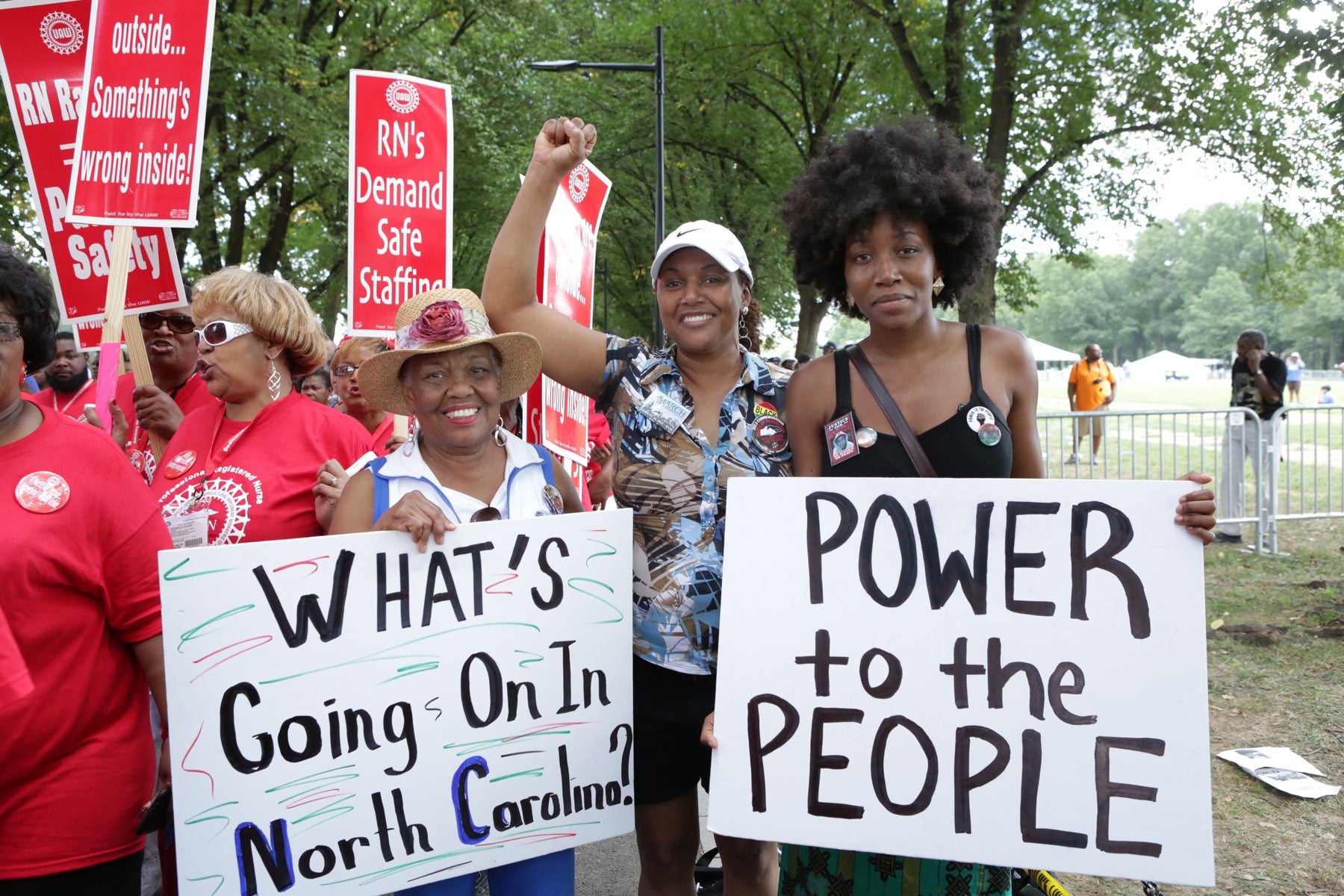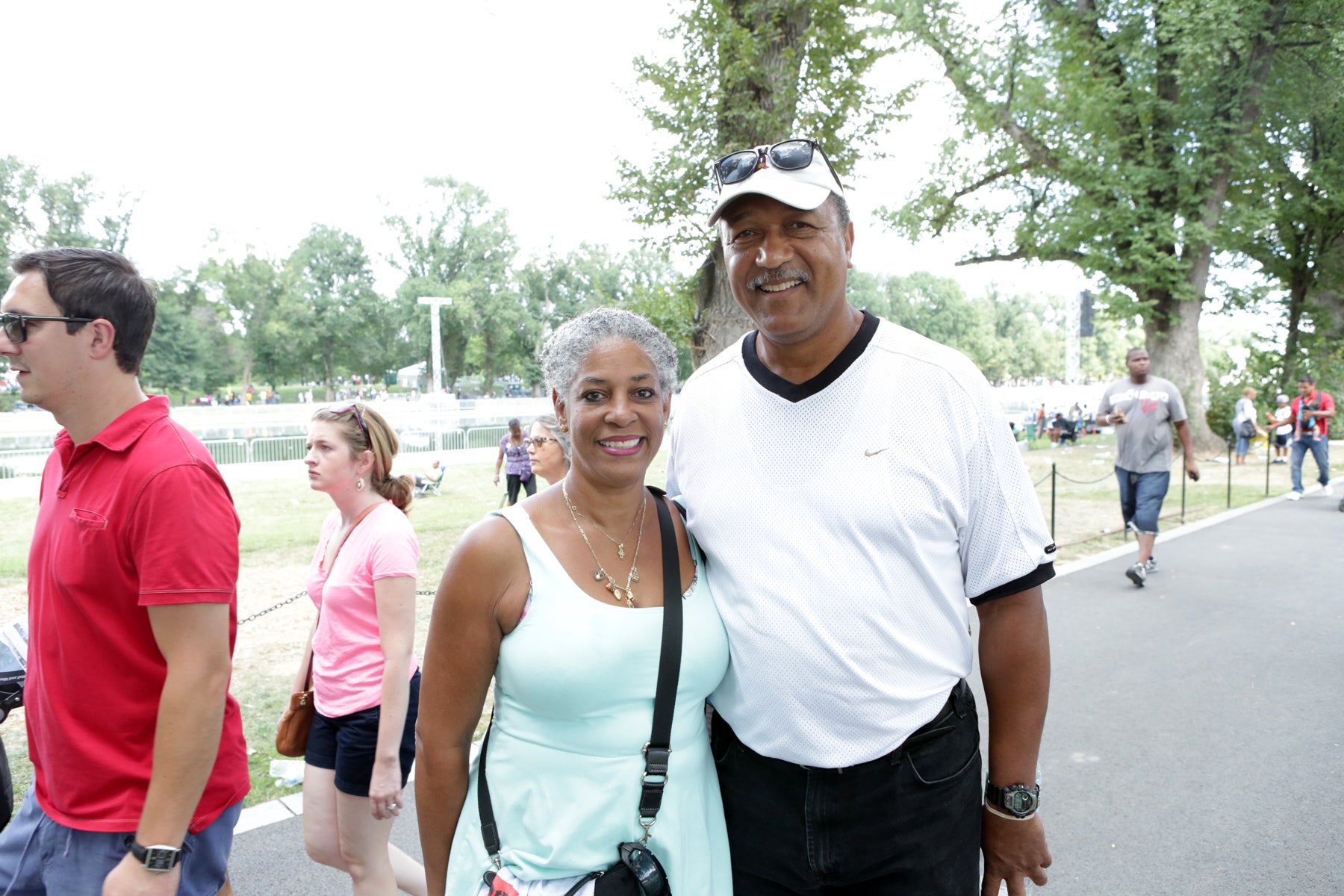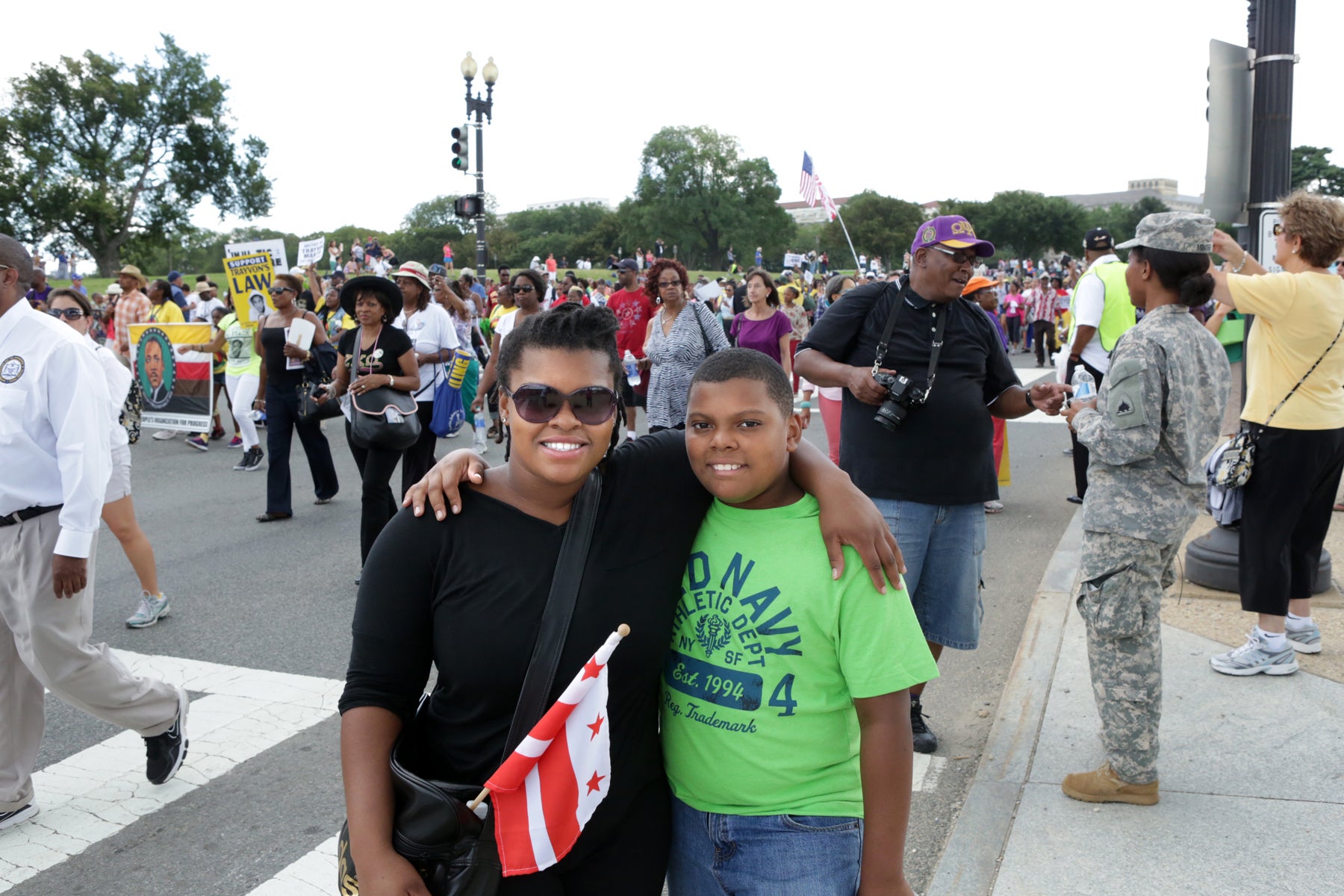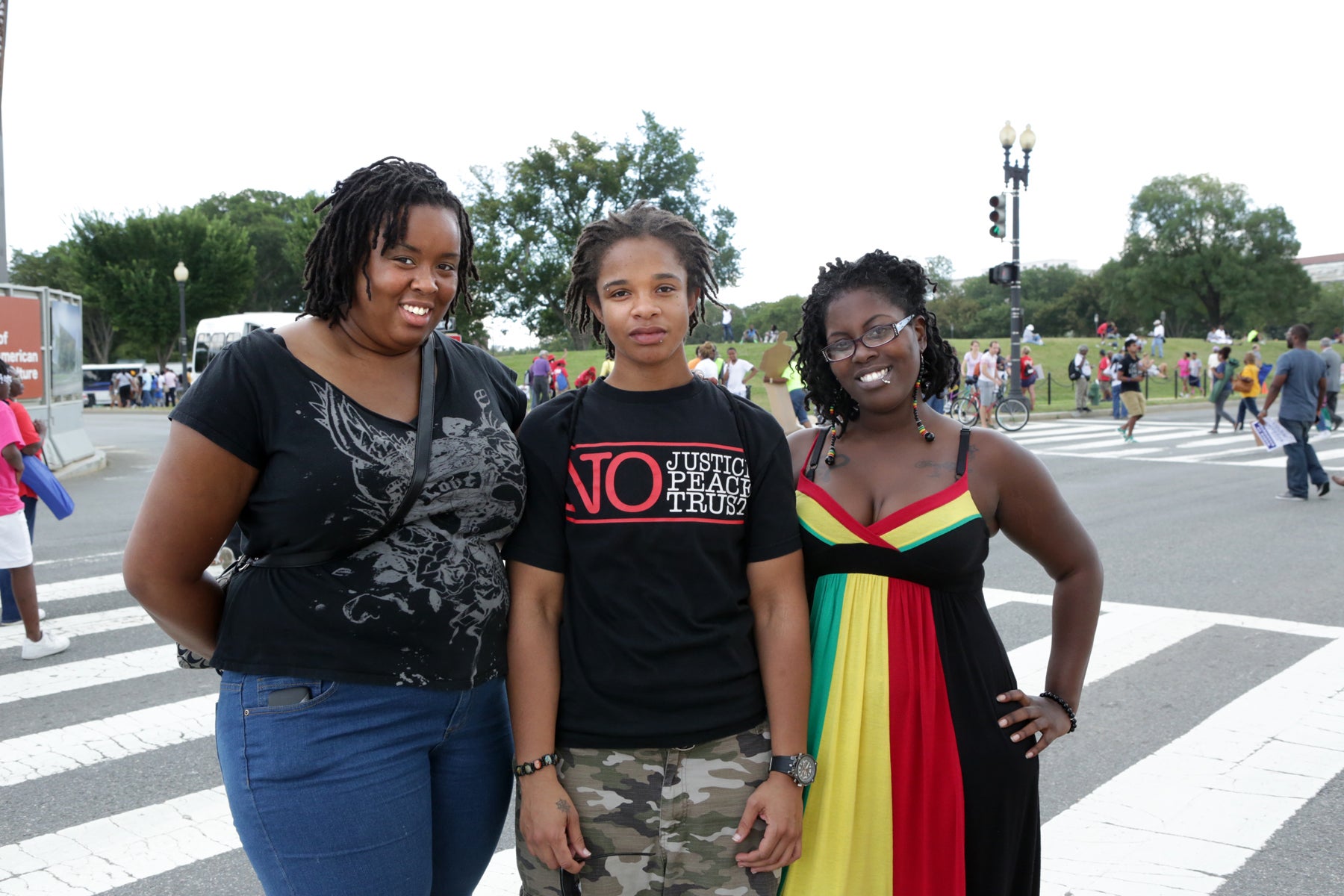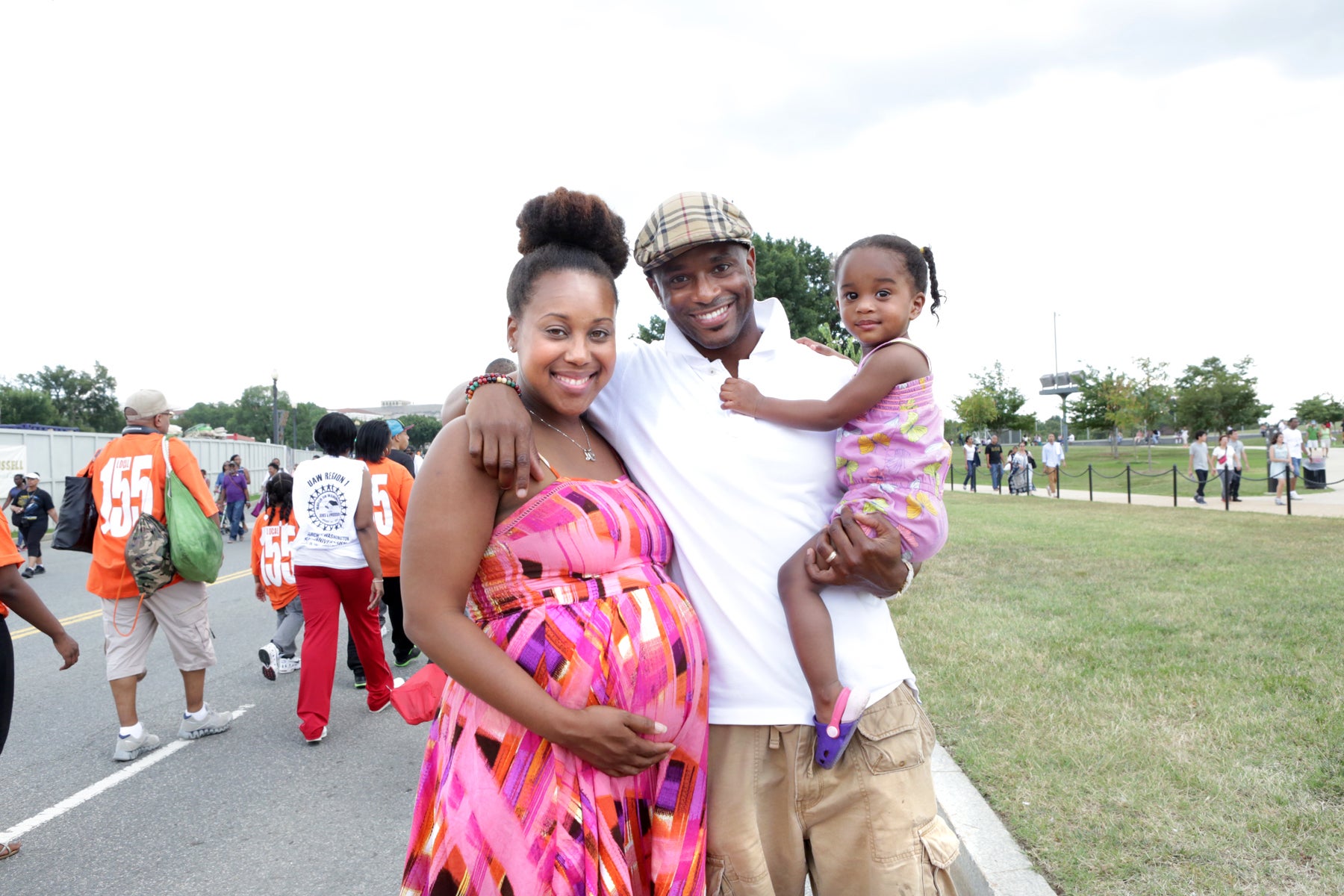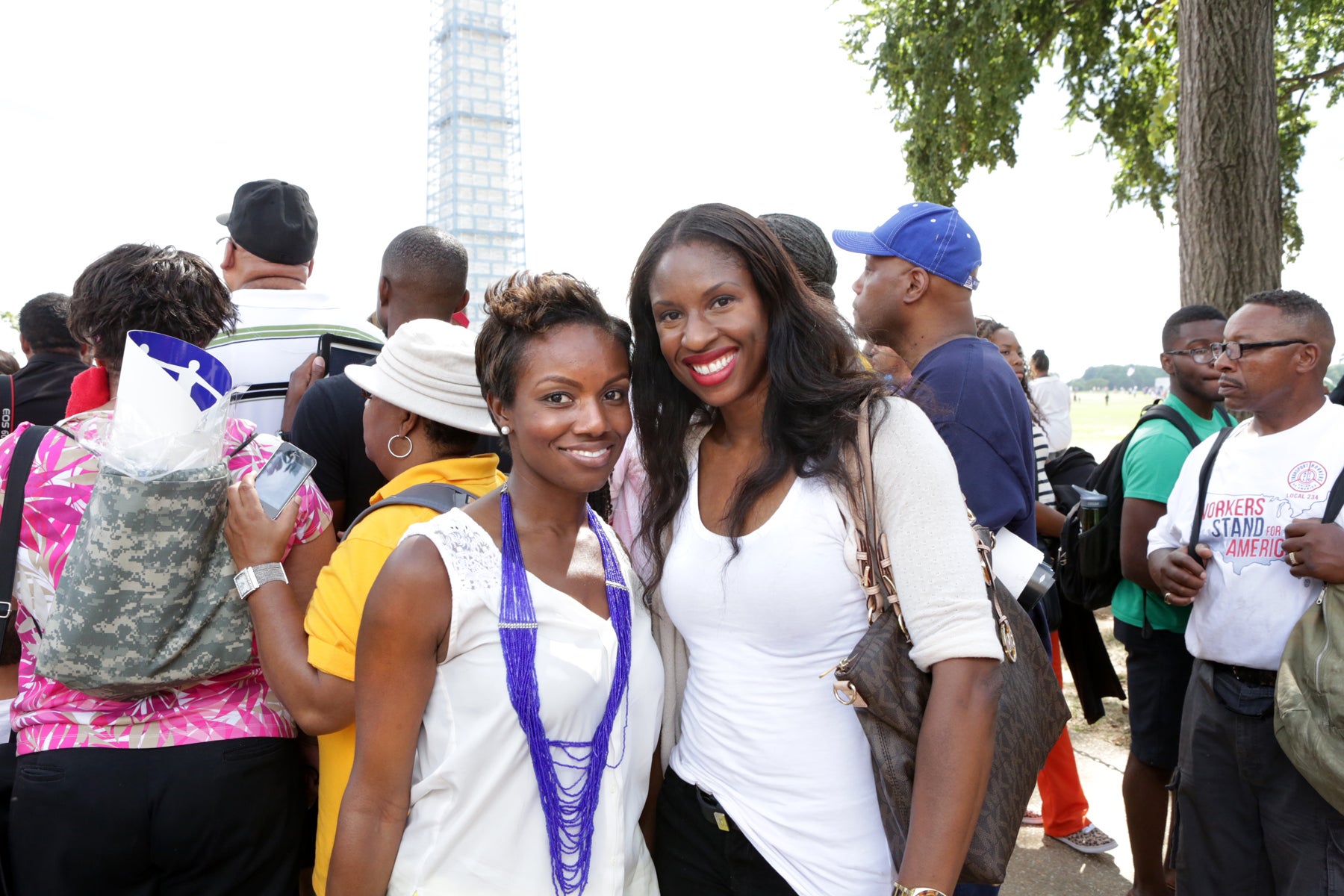Jailyn Anderson, 19, from Miami, Fla. a communications major at Howard University in Washington, D.C. came with her mother, Alicia Sherman-Anderson, 42, who graduated from Howard University in 1992.
Jailyn: “I came because it’s the 50th anniversary and I wanted to experience it. I like the idea of people randomly getting together for a common goal and cause. In the next 50 years, because I’m a student, I’d like to see more aid to students and more loans with lower interest rates.”
Alicia: “I came to the march to be a part of history and to witness all of the races coming together for one common goal—you can feel it in the atmosphere. In 50 years, I definitely hope there is equal pay as far as the genders. I hope the laws have changed as far as the Voting Rights. It doesn’t make sense that some of us can’t vote.”
Alycia Hardy, 24, from D.C. area works for Change to Win, came with her mother Patricia Tallington, 52 of Clinton, Md., who works for the National Education Association.
Alycia: “We came to commemorate the 50th anniversary. We support labor unions and it’s good to be out here to feel the new wave of justice, of people wanting change. I wanted to be out here even though I’m almost 8 months pregnant.” In the next 50 years, I hope we’ll be able to come together as black people and for everyone to feel comfortable—so people won’t have to put on a certain façade to fit in. I want people to not look at me and judge me. A lot of people see me and think I’m a teen mom. They judge me by my appearance.”
Patricia: “I was too young to march last time. I wasn’t going to pass up the opportunity to share in a moment and to be a part of history. I hope the next 50 years, we’ll be equal and realize that we need education. I hope we make an effort to be better and to be together to progress.”
Jean Reid, 72, Brooklyn with her sister Mary Burnside, 73
Jean: “I came for the same reason everyone else is here. I’m fighting for the cause! I hope we have equal rights for Black folks and justice.”
Mary: “This is my second time here. I was here for the first march. I’m here for equal justice for all, especially for our young men and women, because right now, they don’t stand a chance. In the next 50 years, I want equality for each and every one of us in the U.S. I hope we all have the same rights, women have rights and that we don’t have men telling us what to do with our bodies. I hope there is justice for all.”
Jocelyn Battle, 49, D.C. with her kids Madison and Cameron
Jocelyn: “I wanted to come to show my kids. I’ve been telling them about the Civil Rights Movement and how significant those days were. I don’t think kids their age are being taught about the Civil Rights Movement. I wanted them to see all of the people come together.”
Sharon “Shaye” Jackson, 67 born in DC lives in Maryland: “I was 17 at the first march Aug. 28, 1963. I remember most of the speeches and how proud and empowered I felt. What stands out is that it was in color when I was here, but on TV everything was black and white. I came to encourage young people and to continue to pass this on. I came out of my love for Trayvon Martin, who is like Emmitt Till. In 50 years, I hope that globally all evil is eradicated and there is justice for all of Gods people and peace.”
Tracy Felton, 48, Maryland: “This is a historic event and I wanted to show my son and niece something that most people don’t experience. I never want them to forget the work that Malcolm and Martin did. They need to know that the freedom they have was not always there.”
Barbara Gibbs, 60, Maryland: “I’m trained to teach Dr. King’s philosophy of nonviolence and 50 years ago I wasn’t here. I’d like to see Dr. King’s dream come true so that people treat each other as kindly and as generously as possible. It would be nice if war would come to an end. I hope there is peace in the world.”
George Felton, 49: “I came to close the loop. My mother was here 50 years ago. She and my father were educators in Fairfax, Va. and told ‘if you Negroes march you won’t have a job.’ My father, who is still living and was the second Black school principal in this area, thought it was best that only one of them risk their jobs.”
Carol Marsh, 62, Oklahoma: “In 1963, I was one of eight who integrated the schools in Russellville, Ark in the 9th grade. Eight started high school and four of us finished. I came today because I remember in 1963, I felt there was no hope and then I heard Dr. King’s speech and he said we would be treated as equals. I hope we are all treated as equals with equal pay. We all pay taxes and we are all the same. It doesn’t matter the color of our skins. I want our children to feel that there is hope.”
Dea Foy, 49, Dallas, TX: “I was really inspired to come by the Trayvon Martin decision. I hope this country better accepts diversity. Young Black men and brown men make this country strong. It’s time to acknowledge that we’re here and that we’re here to stay.”
Phyllis Hill, 54, Dallas: “I wanted to be a part of history and to show solidarity and support. I hope in 50 years, young people learn to love themselves. Since I’m originally from Chicago, I’m aware of gang violence. At its root is a lack of self love.”
Krystina White, 25, lives in Virginia, originally from Sacramento.: “I came for so many reasons. I was moved by the Trayvon Martin case and I really care about civil rights. In the next 50 years, I’d like to see everyone on the same playing field, for racial profiling to come to an end and for there to be equal educational opportunities for students everywhere.”
Queen Mother, Dr. Delois Blakely, the Community Mayor of Harlem, NY And the Ambassador of Goodwill to Africa
Dr. Blakely: “I came to see what the promise is going to be for the future of our youth and to let people know about the upcoming Million Youth March. My vision out of today’s march is that our youth can carry on the legacy as they interpret it in their future.”
Maxine McCrey, over 60, president of Harlem Women International: “Came to level the playing field in terms of jobs and education and to empower women. In 50 years, I hope there are more jobs, more educational opportunities for kids and that we protect the right to vote.”
Antonio Lyons, 41 from Hollywood, Fla. with friend Marcia Ellis, 61, from DC area
Antonio: “I needed to be here to be among like-minded and like-spirited people. I’m an artivist and I use performing arts as a teaching tool for societal and behavioral change. In 50 years, I hope this march is commemorative, that we will no longer need a call to action, but we’ll be here to celebrate.”
Marcia: “I knew I wanted to come today to witness history. I wanted to see my own energy be renewed in the fight for social justice. There’s a lot of work to do in our community when it comes to HIV/AIDS. I hope our presence can bring us together to continue these fights. In 50 years, I hope the fight is defined differently, that there are other battles.”
Shamsud-Din Haddad, 39, DC: “I came so I could be a part of history. My mother came to the original march, when she was 12. There is no better time for history to start than now. In 50 years, we should have a unified agenda to combat recent changes, especially in the changes in voter laws.”
Kimberly Williams, 43, Charlotte, N.C.: “I came because my family is very strong on civil rights. We have the media and I love the media. We also need people to authenticate the message on a grassroots level. I’m here to take back what I saw and heard—to keep it real. The recession put us all on the same playing field, I hope in 50 years, we’ll continue to come together for the greater good.”
Kourtney Lewis, 21, Boston: “I’m here because I wanted to be a part of history and see it for myself. I hope we have everything we’re fighting for in 50 years: education reform, decrease in violence and lower levels of incarceration among minorities.”
Jazmine Bledsoe, 23, Richmond, VA: “I wanted to be a part of and participate in history. I hope in 50 years there will be a decrease in violence.”
Susan Webb, 56, Bronx, NY: “I came to commemorate 50 years I hope this will spark people to get active. In the next 50 years, I hope the laws are reformed.”
Doris Collins, 59, Manhattan: “I wanted to come because I heard about it when I was 9. It is important for everybody to be a part of something. I hope by then, my grandchildren will be celebrating victories rather than having things taken away.”
Mossi Tull, Sr. 40, 2nd vice president of the Washington, D.C. NAACP chapter, with his 3-year-old son, Mossi “Dutch” Tull Jr. on his neck.
Both are lifetime NAACP members
Mossi Tull: “We’re here because I admired Dr. King and his tenets of always being vigilant in our struggle. We must continue to move forward. In the next 50 years, we need to have federal voting legislation that can’t be overturned, we need to overturn ‘Stand Your Ground’ laws, we need more economic inclusion—not Marxism or Communism, and that historically Black colleges and universities continue to be viable. I’m a fourth generation college graduate on both sides.”
Krystal White, 22, with her mother Linda White, 50, of Los Angeles
Krystal: “I wanted to witness all of the great people who stood before us and spoke on our behalf and to see change.”
Linda: “I came to support the Trayvon Marin story and what Dr. Martin Luther King, Jr. brought forth. The struggles continue.”
Fay Francis, 25, Rochester, NY: “I came to be a part of solidarity. This is a meaningful moment for me.”
Jared Arnold, 25, Philadelphia: “In 50 years, I hope that the education system is improved, there is less violence and that we can come together as one.”
Sequoia Twyman, 25, Coatesville, PA: “I hope there are jobs for everyone and equal opportunities in 50 years.”
Monique Major, 25, Philadelphia: “I’m here to keep Dr. King’s dream alive.”
Kathryn and Edward Anderson, both 69 from Washington, Ga. have been married 13 years.
Edward: “We came to reaffirm our commitment to the Civil Rights Movement and to protest what’s going on in our nation, especially with the Supreme Court striking down Section 4 of the Voting Rights Act and following the decision in the Trayvon Martin case.”
Kathryn: “I hope the Voting Rights Act is re-implemented and that there are no more Trayvon Martin cases. We should have a new generation of leaders. The price of freedom is eternal vigilance.”
Lauren E. Banks, an actor, 22, drove from North Carolina with her mother, Dr. Albertina Smith, 50, a pediatrician in Durham and her grandmother, Lula Glover, 69, of Charlotte who has been known to skydive.
Lauren: “I came because 50 years ago, my grandmother came.” “I pledge to dedicate my art to preserving the stories of yesterday and today that might inspire the capturing the dreams of Dr. King, my mother, my grandmother and of children to come.”
Albertina: “I’m here representing my patient population, 90 percent of which is on Medicaid and 50 percent of which is Hispanic. North Carolina is beginning to disenfranchise them. They are not expanding Medicaid, there is a loss of benefits including food stamps, mothers are not receiving prenatal care. I’m fighting against the policies of North Carolina’s Governor Pat McCrory.” In 50 years, “I want access to good, healthy programs, medicine and for children to attend preschool.”
Lula: “At the first march I was eight months pregnant with Albertina. I came today to commemorate, remember and encourage. “In 50 years, when we have this march, I hope we’re not marching for the same things. I want to inspire children by teaching them to be leaders.”
Cheryl and John Crooks came from Brooklyn.
Cheryl: “I’m here to support the cause. We need to be more visible and active in the struggle. We came to stand our ground.” “I hope that we can move forward and come together. Real change can only come by being actively involved in the fight.”
John: “I wanted to be here because we’ve lost some ground in the struggle toward equality and freedom.” In 50 years, “more Black people should be integrally involved in the Movement—to do more agitation and not be afraid.”
Audreanna Pegram, 24 is from D.C. and came with her 10-year-old son Xavier.
Audreanna: “This is a monumental moment. At one time, we didn’t have these rights. It’s amazing to be a part of history. I brought my son because I want him to say he’s a part of history. People fought and died so he could have equal rights. In 50 years, I want more than this, more equal rights for women. For Blacks, I hope there is no longer an invisible line. A lot of people are scared to talk about race and racism, but it’s still out here. I want us to walk over the line.”
Jenai Morris, 26, from Atlanta came with Portia Christmas, 28, from D.C. and Nityra White, 25 from Amityville, NY
Jenai: “The 50th anniversary is a huge thing. When I first heard the speech, it changed my life. Because of Trayvon Martin, we’re still fighting. The verdict shocked me and was a springboard for me. In 50 years, I want to see true equality—not only in talk, but in practice. Some people say this is a post-racial society, but it’s not. I hope Dr. King’s dream comes to fruition.”
Portia: “I don’t see a lot of activism in my generation. I came to represent. I was moved by the verdict in the Trayvon Martin case. It’s the first major racial injustice that I saw in the Black community in my generation.”
Nityra: “I’m here for Trayvon Martin. I want to wake people up. In 50 years, I’d love for us to be equal and not so governed and so controlled. I hope we have more of a voice.”
Donald Williams, II, 32, and his 8-month pregnant wife Wendy, 37, came with their 21-month-old daughter Noelle.
Donald: “I came partly to experience what my parents and grandparents experienced in terms of marches, sit-ins and boycotts. I want my daughter to be exposed to this environment.”
“In 50 years, Noelle will be 52. I hope the racial mentality of the world has changed for the positive. By then minorities will be the majority. We’ll have more Latino Americans and African Americans in the White House. By then, we’ll have had our first lesbian president. Everything will be totally different.”
Wendy: “I came to be a part of this and to be inspired. In the next 50 years, if we’re still here, I have a very negative perception. I don’t think things will change much. I don’t have a lot of hope. I think it might get worse.”
Monique Rolle, 34 from Richmond, VA came with Cyrille Amegashie of Maryland.
Monique: “I came to be a part of history. I’m a child of the Civil Rights Movement. It’s important to continue the legacy of standing up for our rights—particularly in light of the Trayvon Martin case and the Voting Rights Act.” “I hope we don’t have any Trayvon Martin situations in 50 years and that we have women’s rights and voting rights.”
Cyrille: “I’m here to be alive in this time and to be a part of history. In light of everything that’s going on with basic civil liberties.” “In 50 years, I hope we’ll have those basic civil liberties and that people aren’t struggling for healthcare.”

